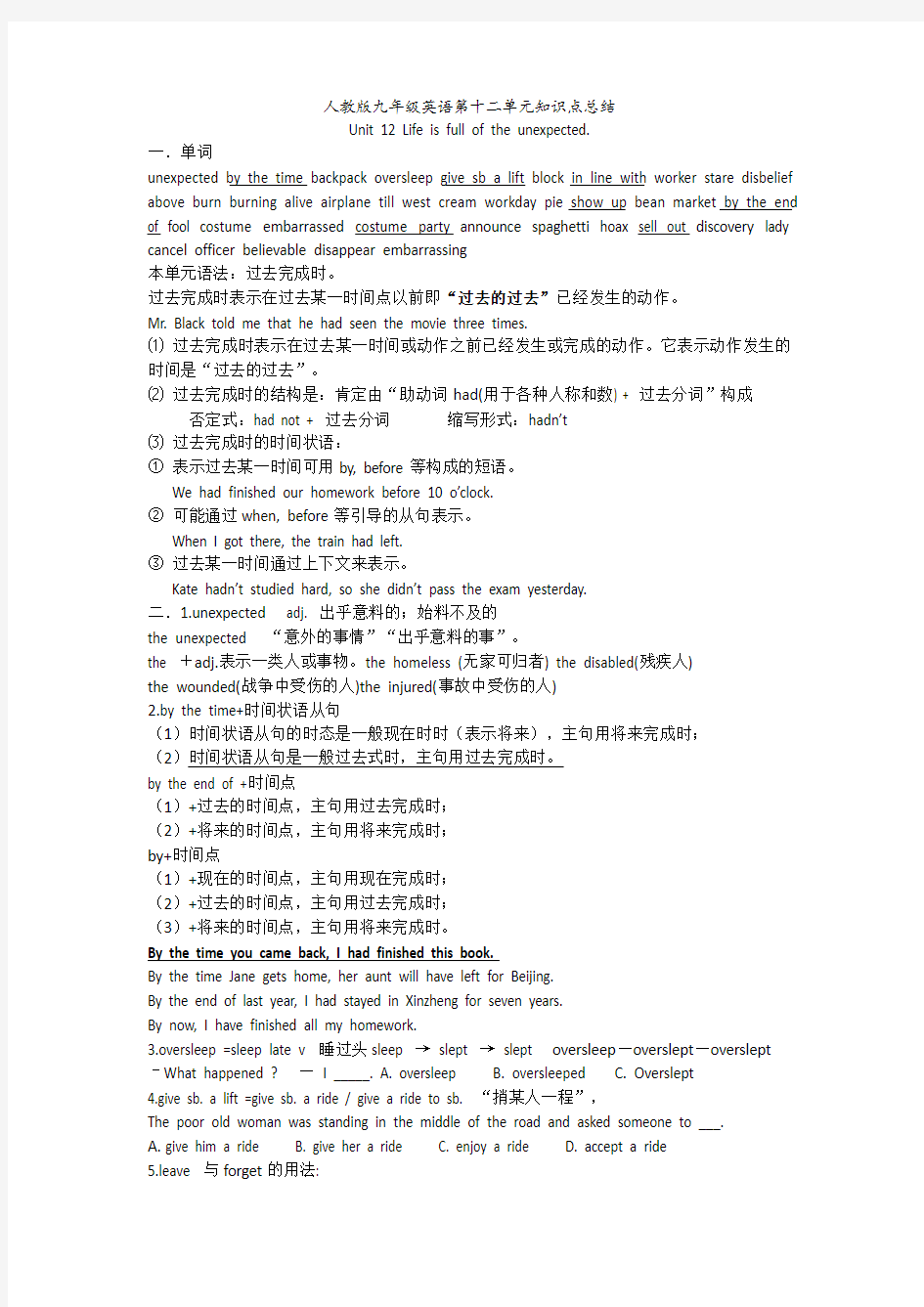人教版九年级英语第十二单元知识点总结

- 1、下载文档前请自行甄别文档内容的完整性,平台不提供额外的编辑、内容补充、找答案等附加服务。
- 2、"仅部分预览"的文档,不可在线预览部分如存在完整性等问题,可反馈申请退款(可完整预览的文档不适用该条件!)。
- 3、如文档侵犯您的权益,请联系客服反馈,我们会尽快为您处理(人工客服工作时间:9:00-18:30)。
人教版九年级英语第十二单元知识点总结
Unit 12 Life is full of the unexpected.
一.单词
unexpected by the time backpack oversleep give sb a lift block in line with worker stare disbelief above burn burning alive airplane till west cream workday pie show up bean market by the end of fool costume embarrassed costume party announce spaghetti hoax sell out discovery lady cancel officer believable disappear embarrassing
本单元语法:过去完成时。
过去完成时表示在过去某一时间点以前即“过去的过去”已经发生的动作。
Mr. Black told me that he had seen the movie three times.
⑴过去完成时表示在过去某一时间或动作之前已经发生或完成的动作。它表示动作发生的时间是“过去的过去”。
⑵过去完成时的结构是:肯定由“助动词had(用于各种人称和数) + 过去分词”构成
否定式:had not + 过去分词缩写形式:hadn’t
⑶过去完成时的时间状语:
①表示过去某一时间可用by, before等构成的短语。
We had finished our homework before 10 o’clock.
②可能通过when, before等引导的从句表示。
When I got there, the train had left.
③过去某一时间通过上下文来表示。
Kate hadn’t studied hard, so she didn’t pass the exam yesterday.
二.1.unexpected adj. 出乎意料的;始料不及的
the unexpected “意外的事情”“出乎意料的事”。
the +adj.表示一类人或事物。the homeless (无家可归者) the disabled(残疾人)
the wounded(战争中受伤的人)the injured(事故中受伤的人)
2.by the time+时间状语从句
(1)时间状语从句的时态是一般现在时时(表示将来),主句用将来完成时;
(2)时间状语从句是一般过去式时,主句用过去完成时。
by the end of +时间点
(1)+过去的时间点,主句用过去完成时;
(2)+将来的时间点,主句用将来完成时;
by+时间点
(1)+现在的时间点,主句用现在完成时;
(2)+过去的时间点,主句用过去完成时;
(3)+将来的时间点,主句用将来完成时。
By the time you came back, I had finished this book.
By the time Jane gets home, her aunt will have left for Beijing.
By the end of last year, I had stayed in Xinzheng for seven years.
By now, I have finished all my homework.
3.oversleep =sleep late v 睡过头sleep →slept →slept oversleep—overslept—overslept
–What happened ? —I _____. A. oversleep B. oversleeped C. Overslept
4.give sb. a lift =give sb. a ride / give a ride to sb. “捎某人一程”,
The poor old woman was standing in the middle of the road and asked someone to ___.
A.give him a ride
B. give her a ride
C. enjoy a ride
D. accept a ride
5.leave 与forget的用法:
(1) leave “遗留,落下,忘记带”,侧重指把某物或某人留在某个地方,后常跟地点状语;
(2)forget “忘记”,侧重指忘记某件事情,后常跟to do (忘了要去做)或doing (忘了做过)。♦leave →left →left v 离开
(1)leave sth +地点把某物遗忘在某地(2)leave for +地点离开去某地
(3) leave a message 留言ask for leave 请假leave school (中学) 毕业
(4)leave one by oneself=leave sb alone 把某人单独留下
6.when的特殊用法“这时,突然”,用于四种结构
1)be doing sth...when I was thinking of this when I heard my name called.
2)be on the point of doing sth...when
She was on the point of going out when the telephone rang
3)be about to do sth...when We were about to start when it began to rain.
4).sb. had hardly/scarcely/barely done sth... when
We had hardly fallen asleep when the bell rang.
另:be about to 忙于;即将做某事。侧重于表示动作马上就要发生,常与when引导的从句连用,但不与具体的时间状语连用。
7.be full of = be filled with充满,装满The basket is full of apples.=The basket is filled with apples.
8.get back to school 意为“回到学校”
1)get back to 后接表地点的名词,意为“回到某地”;
2)get back to 后面接人,可引申为“回复某人的信件,电子邮件,电话”等;
3)get back 还可表示“回来,返回,拿回,取回”等含义。
9.My alarm clock didn’t go off!
go off 发出响声, (闹钟)闹响The alarm went off just now.
go over 复习go away 离开go by (时间)过去go for a walk 出去散步go on 继续
go fishing/shopping/skating/swimming去钓鱼/去买东西/去溜冰/去游泳
10.rush out 冲出去,冲出……wait in line with 意为“与……排队等候”
stand in line 站成一排cut in line 插队stare at 凝视in disbelief 不相信turn into 变成land on 意为“着陆;降落于”be late for迟到go off发出响声
keep doing sth 一直做......wake up 醒来
11.even if / even though/ though 三者都可以引导让步状语从句。
Even if =even though“即使、纵然”引出的从句叙述的是假设或把握很大的事情
though“虽然”,引出的从句叙述的是事实。
I will try even if I may fail. Though it was very late, he went on working.
[注] though 和but 不能同时出现在句中。
12.above
1)prep(表示位置)在…正上方;(与below相对)The moon is now above the trees.
2)prep表示在地位、级别、能力、资历、重要性等方面“超过”He is above me in every way.
3) adv. “在上面; 在上文”。See the examples given above.
13.alive, living, live与lively
lively
1)live“活着的”,通常指物,不指人,常用来作定语放名词的前面。还指“实况转播的”。例如:
a live fish一条活鱼。
Do you like a live show or a recorded show?
